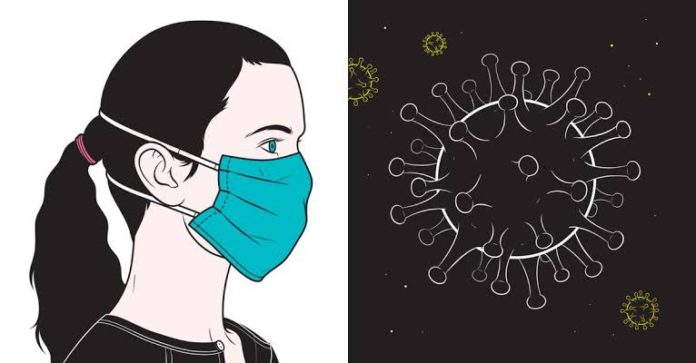A petty virus has affected our lives to such an extent that our traditional routine appears only to be a dream now. We have seen the dangers of a virus epidemic in the past as well, but never before has a new virus or flu paralyzed the world system like this.
Why is all this happening with this CoronaVirus? What’s so significant about this virus that it is so threatening to our lives?
Unique deceptive virus
In the early stages, the virus can deceive the body. Corona viruses could probably be circulating in large numbers in our lungs and our respiratory tract, and yet our body’s immune system could function in a normal way.
“It’s a wonderful virus, it turns your nose into a viral factory and you still feel fine,” says Paul Lehner, a professor at the University of Cambridge in the UK.
When the cells of our body become hostage to the virus, they start releasing chemicals called interferon and this is a warning to the body and its immune system.
But the corona virus has amazing capabilities that allow it to suspend the release system of chemicals that shut down the warning system about the presence of an external virus. “It does it all so well that you have no idea you’re sick,” says Professor Lehner.
He says that if you look at diseased cells in the laboratory, they will not look sick, but if you do your test, these cells will be screaming and saying that they have an infection, and It’s just a ‘joker card’ that can be played by this virus.
The killer virus that escapes after attacking
The number of viruses in our body increases a day before we feel sick. But it takes a week before it is time for a person infected with the corona virus to be taken to hospital for treatment.
“It’s a wonderful evolutionary tactic,” says Professor Lehner. You don’t go to bed, you go out and have fun. ‘So this virus is like a driver who escapes from the scene of an accident. The virus spreads to its second victim long before its first victim dies or appears ill.
In other words, the virus doesn’t care if you die. “It’s a kind of attacking virus that escapes.” It is a very different virus from the 2002 SARS coronavirus. The person felt very sick when he/she got affected, so it was easy to quarantine them.
It’s new virus so our bodies are not ready
Do you remember the last plague? In 2009 there was H1N1, also known as swine flu.
However, it did not prove to be as deadly as feared because people had already begun to protect themselves. The new virus is very similar to the viruses we had encountered in the past.
So far, four more human coronaviruses have been reported, showing symptoms, such as the common cold flu. “its brand new virus, so we don’t know if human immunity works against it,” said Tracy Hassel, a professor at the University of Manchester.
The new Sars-CoV-2 virus, she says, offers a new twist because it could be “very surprising to your immune system.” Corona Virus can be compared to the smallpox virus in Europe and the Americas, which had devastating consequences.
It is very difficult for the elderly to develop immunity because their immune system has already slowed down. Your body is trained through the right and wrong tests to develop immunity against new infections. But as we get older, the number of T cells in our body decreases, which is a basic component of the immune system, so it is difficult to defend against coronavirus due to its absence or depletion.
Corona Virus has unique and unexpected effects on the body
Covid-19 starts as a lung disease (although it still feels weird) and then affects the whole body. Mauro Giaca, a professor at King’s College London, says many aspects of Covid-19 are unique to the disease. “It’s definitely different from other common types of viral diseases.”
He says the virus does more harm than good to lung cells, disrupting the normal functioning of those cells. Cells have been shown to begin to mingle with each other and the overall system begins to malfunction, and this malfunction persists for a long time.
Professor Gayaka says you can do a kind of ‘complete regeneration’ of the lungs after the flu, but with Covid-19 it’s a different case altogether. “It’s a very specific type of infection,” he says.
During Covid-19, blood clots begin to form in a very strange kind of oblique manner, about which many doctors have told their stories that they could not treat the patient properly because the blood clots blocked the veins.
Beverly Hunt, a professor at King’s College London, says some of the Covid-19 patients have been found to have “200 per cent, 300 per cent and even 400 per cent” higher than normal levels of blood-forming chemicals. He says in the journal Inside Health: “Honestly, in my long career, I have never seen a group of so many patients with so much blood.”
This condition that affects the whole body is probably caused by the cellular doorway where the virus travels and grows to infect our cells, called the ACE2 receptor. It is found in every part of our body, including the blood vessels, the liver, the kidneys and the lungs. The virus causes inflammation in some patients, causing the immune system to become more active than usual, with harmful effects on the whole body.
If you are obese
If you are obese, then Covid-19 is even more harmful to you because a fat waist can get you to the intensive care unit or kill you. This is very unusual.
Sir Steven O’Reilly, a professor at the University of Cambridge, says: “The association with obesity has not been found in other viral infections. Obese people with other lung diseases usually have better immunity than worse.
But he says: “It’s very specific to this (Covid-19). It probably happens during a flu pandemic, but it doesn’t happen in the common flu. “Obesity causes fat to build up in the body, especially in organs such as the liver, which can lead to a breakdown in the metabolic system, which in combination with the corona virus causes more damage.
Obese patients are more likely to develop severe inflammation in the body and the protein begins to form blood clots.
Note: The article was first published in BBC Urdu








